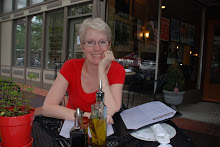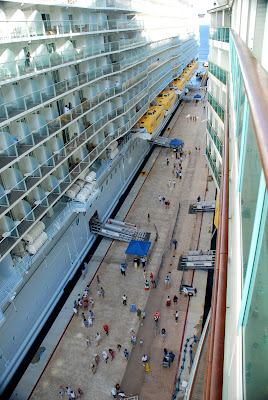 |
 |
 |
 |
 |
I've been thinking about clouds, cloudiness.
Our Caribbean
cruise in January supplied dramatic moments.
I want to talk about literal
clouds.
I like that I, personally, have little control over clouds. I even like
it that when we came back, ready to disembark early Sunday morning, our ship
was stranded three miles from the Galveston port. The clouds had lowered, and
we were engulfed in them. Hour after hour we waited.
 |
| See the top of another ship, just barely showing through the fog? |
Yes, it was a nuisance (and expensive for those missing flights),
but I respect that, in the same way that a Rangers game can be rained out, we humans have
to bow to a power greater than ourselves. In this case, nature. I like the reminder that we are not the center of the universe.
 |
| An ill John rallies, while standing in line for five hours. |
 |
| Customs, another hour wait. The clouds had made a huge difference. |
Clouds.
I even enjoyed the cloud of fake firearms at the Civil War
reenactment in Galveston, the day before our ship embarked.
 |
 |
I truly don't like the abstract cloudiness of my own thinking or the cloudiness of "spin," political maneuvering, and business subterfuge. I want to see clearly, even if it's painful. I want to know, even if it's not to my advantage.
Don't cloud the issues, please. If you do, I can't trust you. And without trust, we can't have intimate relationships or even public relationships – with doctors or church leaders or food growers or governmental representatives or directors of charitable foundations. (Think the Primaries. Think the Komen Foundation/Planned Parenthood. Think Monsanto's altered food.)
But you have me over a barrel: you can keep me cloudy if I don't
have access to the facts. Or, if given the facts, I don't understand them.
That's where the cloudiness from this trip to the Caribbean
comes in. I'm not a scholar of economics or of culture. I am a scholar of the
spirit, though. So I questioned when I saw a totally different world from the
one I experienced in Guatemala and El Salvador on mission trips.
 |
| Lake Atitlan, Guatemala |
In his book Travel,
Joerg Rieger speaks of "Going There and Being There." That's the part
I'm thinking about today.
When we
arrived at our three ports, dancers greeted us.
 |
| Honduras |
 |
 |
 |
 |
| Mexico |
I loved the music, the bright colors, the history they were
preserving, but it was all clouded over. Were we really there?
The dancers and musicians were putting on a show for the
thousands of visitors who piled out of our high-rise ship (all 14 stories), as well as the giant ship that docked beside us.
 |
Yes, this brings them money. But at what cost? And what does it do to the
impression/education of the visitors? Have we now "seen" Honduras? Belize?
Mexico? Do we know their problems? Their dreams? Or is it this fantasy world, set up to keep our heads in the clouds and our feet moving towards the groaning boards of food on the ship? To keep us at arm's length from relating to people because we are so delighted in using them instead of knowing them?
I just finished reading Hotel du Lac by Anita Brookner, winner of the Booker Prize. In it
she talks about gray: Clouds. Mist. Men's suits. Faces. Her mother's silk
peignoir from her wedding night. Overcast skies. "That last gray
day." She feels herself dissolving into the grayness. "A
chill spread from the untenanted lake behind..."
I won't spoil it for you. But she does see through the
grayness and the clouds. In the end. Perhaps in the way you want, perhaps not.
Clouds.
This I know: that when we pay attention, when we have single-minded
focus, when we clear out the gray cobwebs in our hearts and the haze in our
heads, we're better off. As individuals and as a country or a business or an institution, we are only as sick as our secrets, gray and dark and
cloudy as they are.
The concreteness of nature's clouds.
The cloudlessness of an unclouded day in our souls.
I want to be there.


No comments:
Post a Comment